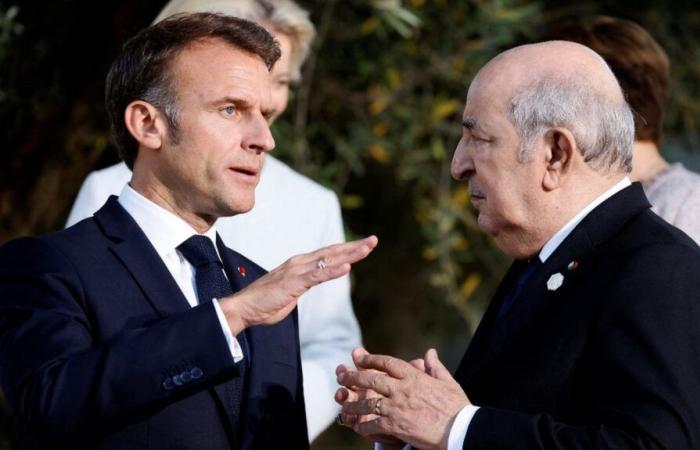
Since the beginning of January, the hateful comments of six Algerian influencers have been reported to the French authorities. Algiers refused to allow one of them to be returned to its soil, which further deteriorated relations between the two countries.
“We can clearly see that Algeria seeks to humiliate France”annoyed the Minister of the Interior, Bruno Retailleau, Friday January 10,after the controversial return to France of the Algerian influencer Doualemn. Despite having a valid biometric passport, Algeria refused the individual’s entry into its territory two days earlier, sparking outrage in Paris. “With Algeria, we have reached an extremely worrying threshold“insisted Bruno Retailleau. “We are in a context of maximum tension, it’s never seen before”for his part estimated the historian Pierre Vermeren, professor at Panthéon-Sorbonne University, specialist in the Maghreb.
After the Franco-Moroccan rapprochement and the arrest of a Franco-Algerian writer in Algiers, this new affair illustrates the deterioration of relations between the two countries, marked in recent months by a series of disputes which slow down the strategy of memorial reconciliation initiated by Emmanuel Macron in 2022. Franceinfo takes stock of the Franco-Algerian crisis.
Tensions around influencers
On January 4, a Algerian influencer is arrested in Montpellier et placed in an administrative detention center (CRA) in Nîmes. The 59-year-old man, nicknamed “Doualemn” on TikTok, is accused of having published a video inciting violence against demonstrators opposed to the Algerian regime. He is deported to his country of origin five days later, before being returned to France the same evening. This decision follows Algiers’ refusal to welcome him on its territory, according to the Ministry of the Interior.
“I think France cannot tolerate this situation.”
Bruno Retailleau, Minister of the Interiorduring a trip to Nantes
A Brest, Youcef A., alias “Zazou Youcef”was also arrested on January 3. He is accused of“public apology for an act of terrorism committed by means of an online public communication service”after calling on its subscribers to carry out attacks in France in order to target opponents of the Algerian regime. In Echirolles, in the suburbs of Grenoble, a former Algerian soldier, known asImad Tintinwas arrested the same day “for death threats materialized in writing, image or other object committed because of race, ethnicity, nation or religion”, according to prosecutor Eric Vaillant. A Lyon, three other influencers have also been reported. Among them, Sofia Benlemmane, a former opponent of the Algerian regime who now shows support for the power in place, was taken into custody on January 9.
According to several Algerian opponents residing in France interviewed by AFP, these particularly violent messages intensified after the change in France’s doctrine on Western Sahara. A theory confirmed by Chawki Benzehra, an activist accusing Algeria of destabilization in France, interviewed by The Worldaccording to whom these influencers act under the direction of actors close to the Algerian government, such as Mehdi Ghezzarbusinessman and ally of President Abdelmadjid Tebboune.
Western Sahara in the background
This is indeed the trigger for the current crisis: a letter made public by the Moroccan royal palace on July 30, 2024 in which Emmanuel Macron notes France’s recognition of the “Moroccan sovereignty” on Western Sahara. This desert territory, the subject of numerous tensions for decades, is 80% controlled by Moroccowhile the Polisario Front, supported by Algeria, campaigns for its independence. France now considers the Moroccan plan for autonomy under its sovereignty as “the only basis” allowing the conflict to be resolved.
This gesture, hailed as a major diplomatic victory by Rabat, is on the contrary seen as a historic betrayal by Algiers. As a result, Algeria recalled its ambassador to Paris and denounced the violation “international legality” against the Sahrawi people. Algiers had however warned on several occasions that any recognition of the “Moroccanness” of Western Sahara would be unacceptable, notes The World.
If in July 2024, France remained determined “to continue deepening its bilateral relationship with Algeria”according to a diplomatic source from franceinfo, Emmanuel Macron’s visit to Morocco three months later, during which the French president spoke once again said to be favorable to the Moroccan plan for Western Sahara, revived Algerian resentments, according to the opposition media The Morning of Algeria. For his part, Jean-Noël Barrot, the head of French diplomacy, assured at the start of the year on RTL to want “maintain the best relations with Algeria”.
A quarrel also due to Boualem Sansal
After the arrest of Franco-Algerian writer Boualem Sansal at Algiers airport in mid-November, Emmanuel Macron attacked “honor” from Algeria. “The Algeria that we love so much and with which we share so many children and so many stories is entering into a story that dishonors it, preventing a seriously ill man from getting treatment.”declared the Head of State in front of the ambassadors gathered at the Elysée.
“It’s not up to par.”
Emmanuel Macron, President of the RepublicJanuary 6, 2025
Emmanuel Macron also denounced detention “total“arbitrarily” of the writer while Boualem Sansal has been transferred to a care unit since mid-December. Until then, he had only expressed himself through his entourage, saying his “concern” for the fate of the 75-year-old writer.
The Algerian Ministry of Foreign Affairs “rejected and condemned” these statements in a press release published on January 7. The government thus asserts “having read, with great astonishment, the comments of the French president concerning Algeria which are disgraceful” and denounced a “shameless and unacceptable interference” from Paris “in an internal Algerian matter”. For its part, the office of the Algerian Parliament described Emmanuel Macron’s remarks as“irresponsible”reports the Turkish press agency Anadolu Agency.
The Algerian press was inflamed. The newspaper L’Expression notably accused France of diving back into “his old demons” while the official daily El Moudjahid a denounced the “dishonor” of French colonial heritage. On December 30, the Algerian head of state, Abdelmadjid Tebboune, also toughened his speech by describing Boualem Sansal as a“impostor”. His detention for attacks on state security followed in particular controversial statements on a French far-right media outlet, where he supported Moroccan claims to western Algeria.





